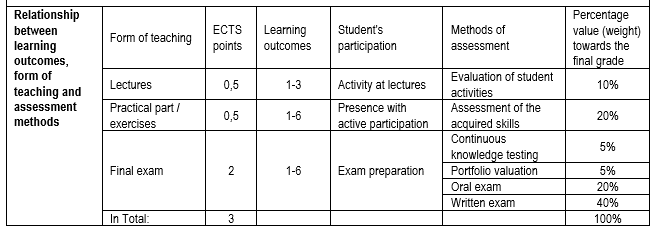Familiarise the student with the fundamentals of didactics, the dynamics of the educational process, and teaching strategies as a basis for the health pedagogical and educational work of future health educators. Teach the student to understand the legitimacy of the educational process and to successfully carry out the educational process.
- What is didactics?
- Didactics as a branch of pedagogy. The relationship between pedagogy, didactics and methodology.
- Relationship of philosophy, social and human sciences to pedagogy, theoretical orientation in didactics.
- Curriculum theory
- Social and individual aspects of goals and tasks. Selection of contents and activities.
- Concept of plan and program. The relationship between program and textbook. The relationship between the teacher and the program.
- The dynamics of the educational process
- Study of interests and needs, programming, planning, preparation.
- Organization - macro and micro outline.
- Implementation of the educational process.
- Principles of organization and implementation.
- Summative and formative assessment. Monitoring, evaluating and guiding students.
- Social forms and strategies
- Social forms for teachers (individual, tandem, team).
- Social forms for students (workshop, group, individual).
- Educational strategies (existence, socialization, individuation).
- Educational strategies (learning, experiencing, practicing, and creating).
- Conditions of the educational process
- Natural and social environment, field trips and excursions, school environment, school grounds, classroom
- Visual media, auditory, audiovisual media, text media, computers.
- Authoritarian, democratic, violent and non-violent communication.
- Social climate, emotional climate.
- The relationship between theory and practice
- Changes in theory and practice. Your own vision of the didactic future and your personal place in it.
OBAVEZNA LITERATURA
- Bognar,L./Matijević,M. (2005.) Didaktika, Školska knjiga, Zagreb
- Jelavić,F. (1995.) Didaktičke osnove nastave, Naklada Slap, Jastrebarsko
- Bognar,L. (2001.) Metodika odgoja, Pedagoški fakultet, Osijek
DOPUNSKA LITERATURA
- Peko,A./Pintarić,A. (1999.) Uvod u didaktiku hrvatskog jezika, Pedagoški fakultet, Osijek
- Desforges,C. (2001.) Uspješno učenje i poučavanje: psihologijski pristupi, Educa, Zagreb
- Terhart, E. (2001.) Metode poučavanja i učenja, Educa, Zagre
Upon completion of this course, students will be able to:
- Argue the basic concepts, interrelationships of pedagogy, didactics and methods of education
- Explain the relationship of social sciences and humanities to pedagogy and theoretical orientation in didactics
- Argue curriculum theory
- Organize the educational process in accordance with the principles of organization and performance
- Use appropriate social forms and strategies of upbringing and education, teaching aids and aids
- Evaluate the educational process



